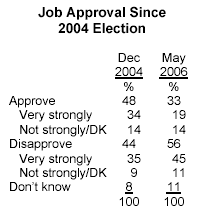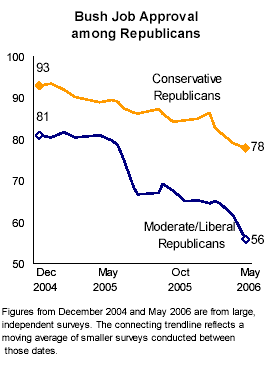by Courtney Kennedy and Michael Dimock
Pew Research Center for the People & the Press
 As public approval of George W. Bush languishes at all-time low levels, supporters of the president are increasingly hard to find. In the months following his re-election, roughly half of the country rated Bush’s job performance favorably. Today only a third of Americans do so, while more than half (56%) disapprove of his performance. These latest figures are based on a Pew Research Center survey conducted April 27-May 22, among a national sample of 3,204 adults, a large enough survey to allow for a more detailed breakdown of where and how opinion has changed since the election.
As public approval of George W. Bush languishes at all-time low levels, supporters of the president are increasingly hard to find. In the months following his re-election, roughly half of the country rated Bush’s job performance favorably. Today only a third of Americans do so, while more than half (56%) disapprove of his performance. These latest figures are based on a Pew Research Center survey conducted April 27-May 22, among a national sample of 3,204 adults, a large enough survey to allow for a more detailed breakdown of where and how opinion has changed since the election.
While the decline in support transcends ideological and demographic lines, the drop among one group – moderate Republicans – has been especially steep. Among all Republicans, Bush’s job approval rating has dropped 20 percentage points since December 2004 (from 89% to 69%). This erosion of support has been most severe among Republicans describing themselves as moderate or liberal, where his rating has dropped 25 points from 81% to 56%.
 Conservative Republican support for Bush has also declined, but more gradually. Approval among this group was nearly unanimous (93%) following his re-election, and stands 15 points lower at 78% today.
Conservative Republican support for Bush has also declined, but more gradually. Approval among this group was nearly unanimous (93%) following his re-election, and stands 15 points lower at 78% today.
But there are far more conservatives than moderates in the GOP; as many as two-thirds of Republicans identify themselves as conservative. This means that even though the drop off in their support has been more gradual, the implications are no less serious. Translated into real numbers, just as many conservative Republicans as moderate and liberal Republicans have grown frustrated with the president’s leadership over the past year-and-a-half. While a much larger share of moderate and liberal Republicans disapprove of the president, they make up only a minority of the GOP.
Within the Republican Party, moderate women stand out for their lack of support for the president. Through most of Bush’s presidency he has been evaluated similarly by men and women within the GOP, but this latest survey shows signs of a potential gender gap. Currently, only half (51%) of Republican women who describe themselves as moderate or liberal approve of Bush’s job performance – a falloff of 31 percentage points since his re-election. By comparison, his approval rating among moderate and liberal Republican men stands at just over six-in-ten (62%) down only 19 points over this same period. There is no gender gap in presidential approval among more conservative Republicans.
 In addition to losing support within his partisan base, the president has lost much of the backing of independents that helped him win reelection in 2004. Job approval among independents has fallen from 45% to 26% since the post-election period. By comparison, Bush has lost less support among Democrats, but there was little support to lose. In December of 2004, 17% of Democrats rated the president’s performance positively; just 9% do so today.
In addition to losing support within his partisan base, the president has lost much of the backing of independents that helped him win reelection in 2004. Job approval among independents has fallen from 45% to 26% since the post-election period. By comparison, Bush has lost less support among Democrats, but there was little support to lose. In December of 2004, 17% of Democrats rated the president’s performance positively; just 9% do so today.
Beyond Party: Bush Struggles in All Groups
Even white evangelical Protestants, a traditional Republican constituency, are expressing more dissatisfaction with the president today. Barely half (55%) of white Evangelicals now approve of the job Bush is doing, down from 77% following the 2004 election.
Looking at various population groups across all partisan lines, the decline in Bush’s approval rating is fairly consistent among various groups with the largest drops coming from those who had supported him the most strongly and, thus, had the farthest to fall. For example, more than half (53%) of seniors rated Bush’s performance positively on the heels of his re-election, while just a third do so today. Meanwhile, Bush’s rating among Americans under age 30 fell just 11 percentage points during that time from an already marginal rating of 40% down to 29% today.
Similarly, Bush has lost support across all regions of the country. In the South, where Bush is viewed most favorably, his job approval has dropped 20 points from 56% to 36%. In the Northeast, where he has had the least support throughout his presidency, approval has fallen 12 points from 39% to 27% today.
The percent of Hispanics who approve of Bush’s performance in office is down from 45% to 29% since the election, and African-Americans continue to view Bush very negatively.
Support for the president is down across the socioeconomic spectrum as well, among both wealthy and poor, and those with more and less education. If anything, positive views of Bush’s performance have fallen most sharply in the middle-income brackets. Among those with a household income in the $30,000-$75,000 range, approval has dropped roughly 20 percentage points compared with 12- and 13-point drops among the most wealthy and least wealthy, respectively.
Even Core Constituents Less Enthusiastic
Beyond the overall balance of opinion, the intensity of views about Bush has changed as well. After his re-election, comparable numbers strongly approved and strongly disapproved of his job performance (34% vs. 35%). Today those who strongly disapprove of his performance outnumber those who strongly approve by more than two-to-one (45% vs. 19%, respectively).
Even among key Republican constituencies, support for Bush has been waning – not necessarily from approval to disapproval but from strong approval to a somewhat weaker endorsement. In December 2004, more than eight-in-ten (81%) conservative Republicans strongly approved of Bush’s job in office, but closer to half (54%) feel this way today. Similarly, the number of white, evangelical Protestants strongly backing the president has fallen from six-in-ten after his re-election down to 34% today. Strong support for Bush has declined at similar rates among southerners (40% to 20%), high income earners (34% to 22%), weekly church-goers (42% to 25%), and those who are married with young children (41% to 26%).


